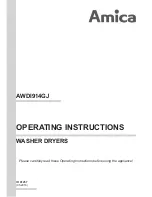
EN
10
4.3 LOADS OF WASHING
As far as possible,
to save electricity, it is more economical to wash complete
loads of the
various types of
fabric
. Shake out the washing before loading, and alternate large and small items. It is best to weight the load the
first few times, after which you will be able to rely on your experience. As a guide, the following is a list of the av-
erage weights of the standard items:
4.4 LOADING THE ITEMS FOR WASHING
1. Open the door and load the washing, distributing it evenly over the drum, with items opened out and not
bundled together; if possible, large and small items should be well mixed.
2. The washing machine covered by this manual can be
loaded with up to 7kg
of washing for each wash.
If this weight is exceeded, the washing results will be poor and the appliance may malfunction.
3.
To save energy it is more economical to wash full loads
of the various types of fabric, following the
guidance on quantities provided in the “Programmes Table” supplied in this manual.
4. Close the door by pressing against the frame until you hear it click shut. Take care not to trap items of
washing between the door and the rubber gasket.
Warning!
•
If the door is not properly closed, a safety device prevents the washing machine from starting.
•
Do not exceed the maximum load: overloading adversely affects washing results.
4.5 ADDING DETERGENT AND ADDITIVE
The internal tray comprises three compartments, marked with the symbols
prewash detergent
main wash detergent
for fabric conditioner, starch, additives, etc. (e.g. treatment products).
The additives are added to
the washing tank automatically during the final rinse.
The main wash detergent compartment has a tang allowing the use of liquid detergent. To insert it, pull it towards
the front and then lower it.
Following the recommendations in the "Programmes Table" supplied
with this manual, place the detergent and any additives in the drawer
before the start of the programme.
Never fill with liquids above the maximum level marked
; otherwise
the trays will empty too quickly.
Before pouring dense additives into the container, dilute with a little
water to ensure they do not clog the outlet.
Use only low-foam detergents suitable for use in a washing machine.
The amount of detergent must be decided in relation of the hard-
ness of the water, the type and quantity of items loaded, and their
degree of dirt.
This will provide the desired effect with optimal detergent consump-
tion.
On detergent packs the recommended dose is indicated for 4 levels of water hardness and for loads of 4-5 kg of
washing with average dirt levels.
Request information about the water's hardness from your water supply company.
Water hardness
Level of hardness
French degrees fH
German degrees dH
Soft
Up to 15°
Up to 8°
Medium
15° - 25°
8° - 14°
Hard
25° - 40°
14° - 22°
Very hard
More than 40°
More than 22°












































